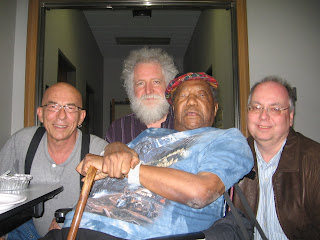 Ramblin’ Jack Elliott
Ramblin’ Jack Elliott
A Stranger Here
Anti-
anti.com
ramblinjack.comThere’s so much that can be said about Ramblin’ Jack Elliott. He spent time with Woody Guthrie and his family in the early-1950s, travelled with Woody on his last great road trip and was the prototype for the young Bob Dylan a decade later.
Jack spent part of the 1950s in England where his performances and early recordings inspired people like Mick Jagger, Keith Richards and Rod Stewart to get guitars and learn folk music. Mick Jagger has been quoted as saying that bought his first guitar after seeing Jack perform when he was a school kid.
Jack has an amazing repertoire of Woody Guthrie songs, Dylan songs, traditional cowboy ballads, blues, truck driving songs, Lead Belly songs and much else. And he’s one of the greatest storytellers of all time. I once saw him on stage for an hour, keeping the audience enthralled and in stitches and only getting around to, maybe, three songs.
I first met Jack in 1971 when he played a five-night stand at the Back Door, a Montreal coffee house that closed shortly after his gig there. I was 17 years old and fascinated with Woody Guthrie. I watched Jack perform for three or four nights and then ventured into the back room and asked him about Woody. He talked to me about Woody Guthrie for a long time that night, 38 years ago.
Over the years I’ve seen Jack many times and in many different situations: with Bob Dylan’s Rolling Thunder Revue, at folk festivals, and in concerts and coffeehouses; we worked together several times when he played at the Golem, the Montreal coffeehouse that I ran from 1974-’76 and 1981-‘87. I got introduce Jack when he came back to Montreal, for his first Montreal concert since the Golem, in 2006 to play the Pop Montreal festival.
Ramblin’ Jack Elliott’s life is the stuff of legend and myth. You never know what Jack might do, or where he might take us, in any given show or on any given record. On this record, Jack’s takes us deep into the country blues performing classic songs. Some of these songs come from early masters of the genre like Blind Lemon Jefferson and Leroy Carr who were long gone before Jack arrived on the scene as Woody’s apprentice 60 or so years ago. Others come from artists like Mississippi John Hurt and Reverend Gary Davis who Jack would have had the opportunity to know during the folk and blues revival of the 1960s. Of the 10 songs, I only recognize one, “How Long Blues,” as one that Jack has done before.
While Jack has included blues on many of his earlier albums, this is the first time he’s devoted a whole set to the genre. Working with producer Joe Henry and a remarkably creative studio band including such stellar musicians as Van Dyke Parks, Greg Leisz, David Hidalgo and David Piltch, Jack sounds amazingly free and relaxed in singing these songs. Although he doesn’t sound at all like her, there’s a Billie Holiday-like quality to his singing. The arrangements seem to be both as old as the songs – and as Jack himself – and, yet, utterly new and contemporary.
I believe it was Greil Marcus who coined the term “old weird America” to describe the wonderful music that Harry Smith compiled in his landmark Anthology of American Folk Music and that was so inspirational to subsequent generations of folk music revivalists. Ramblin’ Jack Elliott’s
A Stranger Here is a contemporary take on old weird America.
–Mike Regenstreif













